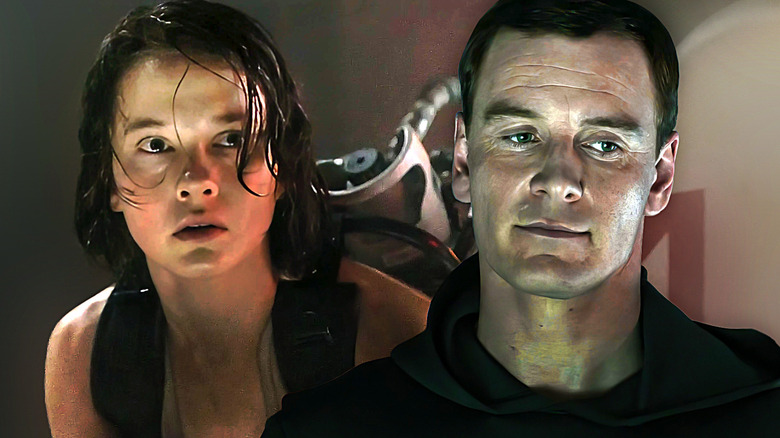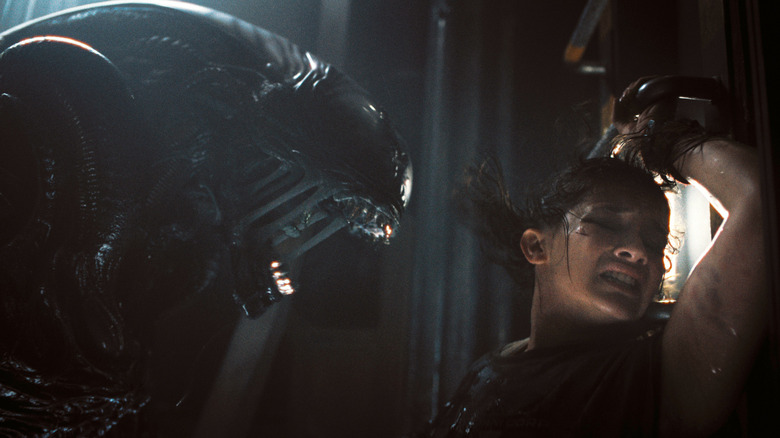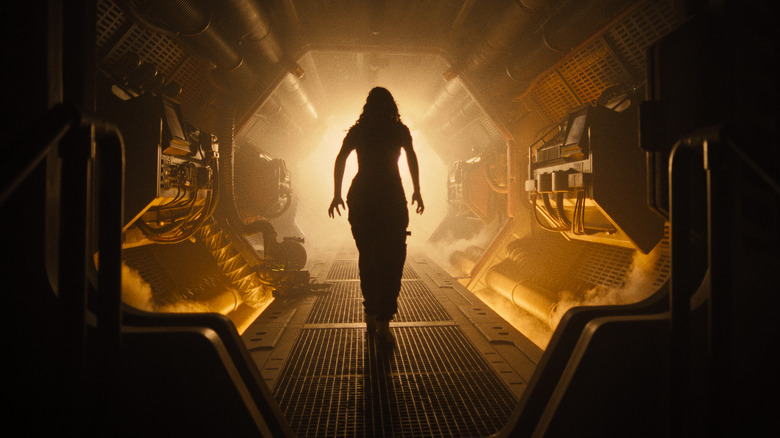The second entry in Ridley Scott’s “Alien” prequel series, “Alien: Covenant,” is probably the most divisive film in the entire franchise. So much so, we at /Film released two contrasting reviews — a positive, 8 out of 10 from Karen Han, and a pretty scathing 4 out of 10 from Josh Spiegel that came with the headline “In Space, No One Can Hear You Be This Stupid.” Personally, I fall somewhere in the middle. I’m a staunch “Prometheus” defender (don’t @ me) and think the downright meanness of “Covenant” is a feature and not a bug. But there’s one aspect that, try as I might, I just can’t shake. I’m sorry Sir Ridley Scott, but the CGI is bonk at best and ropey at worst.
The threat of the Xenomorph XX121 species in its many life cycle stages is instantly diluted when it doesn’t look like it’s sharing the same space as the humans it’s attacking. Xenomorphs are the thing of psychosexual sci-fi nightmares, but there are moments in “Covenant” where the CGI Xenomorphs look so shiny and move with such unnatural flow that they look more at home in those awful fanmade fake trailers people upload to YouTube to farm engagement from unsuspecting fans. On paper, “Alien: Covenant” should be my favorite in the series, but it’s so hard to invest in the characters when the Praetomorph runs like M3GAN on all fours.
I am not anti-CGI, I am anti-CGI-when-practical-effects-have-already-been-proven-to-be-better. Scott disagreed, telling Yahoo Movies it gave him more room to be creative and he thought he “could do a lot more than just having a guy running around in a rubber suit which is all [he] had way back when, which worked pretty well actually.” Again, no disrespect to the master, but something was lost when the aliens went digital. Fortunately, “Alien: Romulus” has found the balance by prioritizing practical effects with CGI enhancements.
Alien: Romulus used giants in suits, animatronics, and even stop-motion
“Alien: Romulus” has “Evil Dead” and “Don’t Breathe” director Fede Álvarez at the helm, who has been very vocal about returning the series to its practical roots. With “Romulus” set timeline-wise between the events of “Alien” and “Aliens,” it’s also thematically appropriate to attempt to match the look and feel of the earlier films. “I have this obsession with no green screens, so we built every creature and set,” he told The Hollywood Reporter. “Everything had to be built so we were really living and breathing in these spaces […] when it comes to face-to-face encounters and moments with creatures, nothing beats the real thing.” He also stressed that he’s not anti-CGI, pointing out that part of how he nabbed the gig doing “Evil Dead” was his short film “Panic Attack!” where he and his friends provided all the VFX shots themselves.
Instead of a full replacement, Álvarez uses CGI to enhance “Romulus,” with the practical builds remaining the focus. Tall actors like Trevor Newlin and Robert Bobroczkyi were hired to don Alien suits, the legendary Phil Tippett studio was hired to make a stop-motion rat for a regeneration scene, effects artist Ian Hunter made miniature spaceships that were either filmed directly for close-ups or scanned into CGI so artists wouldn’t have to create something from scratch. The result is a space station and a gaggle of aliens in various life stages that feel lived-in, tangible, and scary as hell.
The perfect marriage of practical FX and VFX
Hailing the return of practical aliens who look like they’re actually sharing the same plane as the humans they’re about to forcibly impregnate with an ovipositor or eat with an inner mouth is not to take away from the gorgeous VFX work incorporated into “Romulus.” The work comes courtesy of a collaboration of the best in the business, including Wētā FX, Industrial Light & Magic (ILM), Fin Design + Effects, Image Engine, Tippett Studio, Wylie Co., and Atomic Arts.
Opting for a marriage between practical FX and VFX allows Álvarez to play in the largest creative sandbox possible. As audiences’ eyes focus on a practical Xenomorph in their direct line of vision, digital Xenomorphs or other creepy-crawlies can attack from other angles without looking out of place. As the miniature ship flies through the air, the vast beauty of outer space consumes the viewer and it seems as if we’re eavesdropping the travel patterns of an actual ship.
The practical effects have been given much attention in the lead-up to the film’s release, but it’s not because one art form is better than the other. Rather, it’s because practical effects seem to be a dying artform … at least in the eyes of the folks who write the checks to make movies. VFX workers at Marvel Studios, for example, recently unionized after reports of overworking, because by devaluing the art of practical FX, the VFX workers have been doing twice the work. Both art forms make magic, but combining them together can make a miracle.
“Alien: Romulus” is now playing in theaters everywhere.





